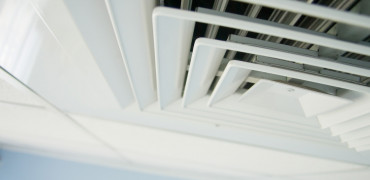HVAC stands for Heating, Ventilation, and Air Conditioning, and it relates to mechanical equipment and systems that can regulate the temperature and the air quality of a building.
People are often confused over the difference between HVAC and air conditioning, however there is no real “difference” as such, simply remember that air conditioning is one of several different systems that can be described as an HVAC system.
So, what are the components of a HVAC system?
HVAC can help improve air quality, increase comfort and reduce energy use and emissions
Heating
Heating is the process of raising the temperature inside a building to a comfortable level.
Heating accounts for almost a third of all UK carbon emissions, so changing how we heat our buildings is now critical to tackling climate change and reaching net zero.
HVAC systems can use a variety of methods to heat a building, including furnaces and boilers, running on carbon-intense gas and oil, or more sustainable electric heating including modern heat pumps.
Mitsubishi Electric currently provides what we believe is the widest range of commercial and residential heat pumps on the market.
From our ultra-quiet Ecodan models suited for residential heating or light commercial use to the recently launched MEHP-iS-G07 commercial heat pump chiller from our Italian factory, and the new scalable Ecodan CAHV-R commercial air source heat pump there is a renewable heating system that is perfect for just about any building.
The UK government is running multiple schemes to help homeowners and public sector organistations access funding for renewable heating solutions such as the Boiler Upgrade Scheme and the Public Sector Decarbonisation Scheme otherwise known as SALIX.
Ventilation
Ventilation is the process of bringing in fresh air from outside to remove stale air and excess moisture from inside the building.
Good ventilation is important for maintaining good indoor air quality (IAQ), which can affect the health of the building's occupants.
Along with the Building Engineering Services Association (BESA), we recently published an Award-Winning Guide to IAQ which details all the important points that you should consider for your building and what to do next. Called the BASH Guide (Buildings As Safe Havens), it can be downloaded for free here.
HVAC systems can also include filtration which can remove dust, pollen, viruses and other pollutants such as NOx from the air.
The Plasma Quad Connect system can be bolted on to existing air conditioning units to filter out viruses and pollutants.
The Residential Lossnay ventilation unit is also unique because it has a third filter slot to offer homes even more protection from outside pollutants.
Air Conditioning
Air conditioning, often referred to as A/C is important for maintaining a comfortable indoor temperature, especially during hot summer months.
However, most people don’t realise that air conditioning can also heat a building as well as cool it. The best systems can do this simultaneously so that excess heat from one area, like a computer room or gym, can be captured and moved to heat another area of the building, such as offices or hotel rooms.
Not only can this make the whole system much more energy efficient, but it can also reduce energy consumption to lower both energy bills and carbon footprints.
Modern air conditioning can be fitted in any building from a garden office to a garden centre. It allows for a huge range of energy efficient systems, suitable for almost any application.
The M-Series systems are a great match for homes and garden rooms, while the City Multi HVRF heat recovery systems allow simultaneous heating and cooling to different areas of a building, and are perfect for offices, hotels and leisure facilities.
What are the benefits of HVAC
Having a properly functioning HVAC system can provide a number of benefits to both building managers and occupants alike, for example:
- Improved indoor air quality: By providing ventilation and air filtration, HVAC systems can help improve the quality of the air inside a building.
- Increased comfort: HVAC systems can help maintain a comfortable indoor temperature year-round, which can improve the productivity and wellbeing of the building's occupants.
- Energy savings: Properly maintained HVAC systems can operate more efficiently, which can lead to energy savings and lower utility bills.
In summary, HVAC is a system that not only allows you to control the temperature and air quality inside a building, but it can also help control energy use and reduce your carbon footprint.
By providing heating, ventilation, and air conditioning, HVAC systems can help maintain a comfortable and healthy indoor environment.
It is important you subject your HVAC system to a regular service & maintenance regime to ensure optimal efficiency
If you are looking for a HVAC contractor to assist you with your project, why don’t you use the find an installer tool to locate and contact your nearest Mitsubishi Electric Approved Installer, and get your project underway.
Jonathon Tait is Digital Marketing Executive for Mitsubishi Electric




